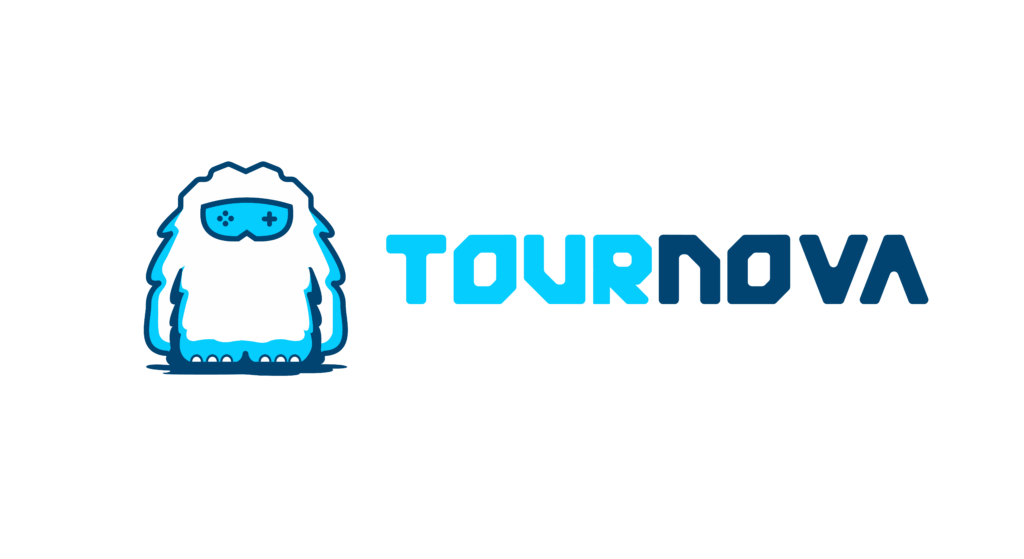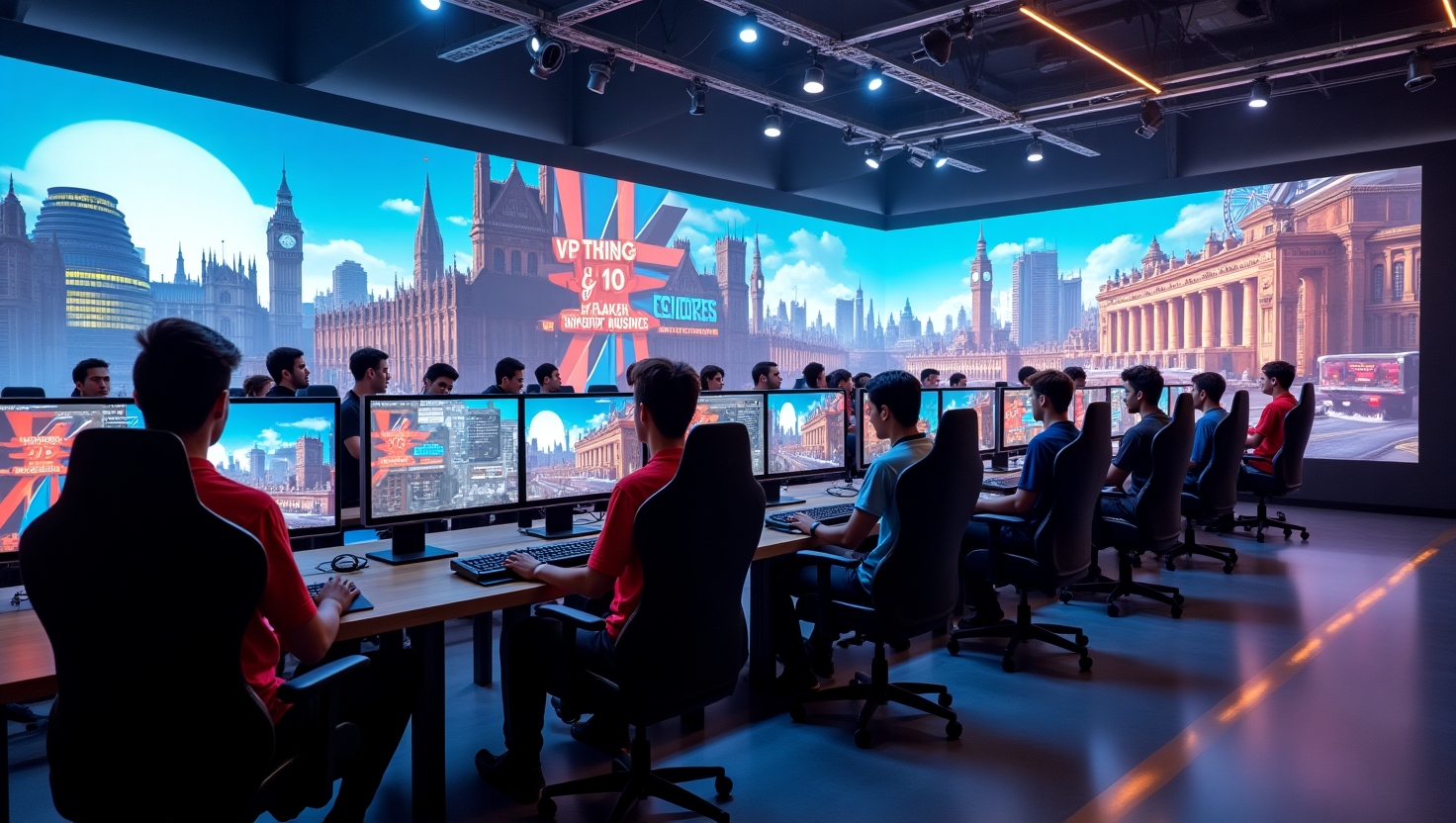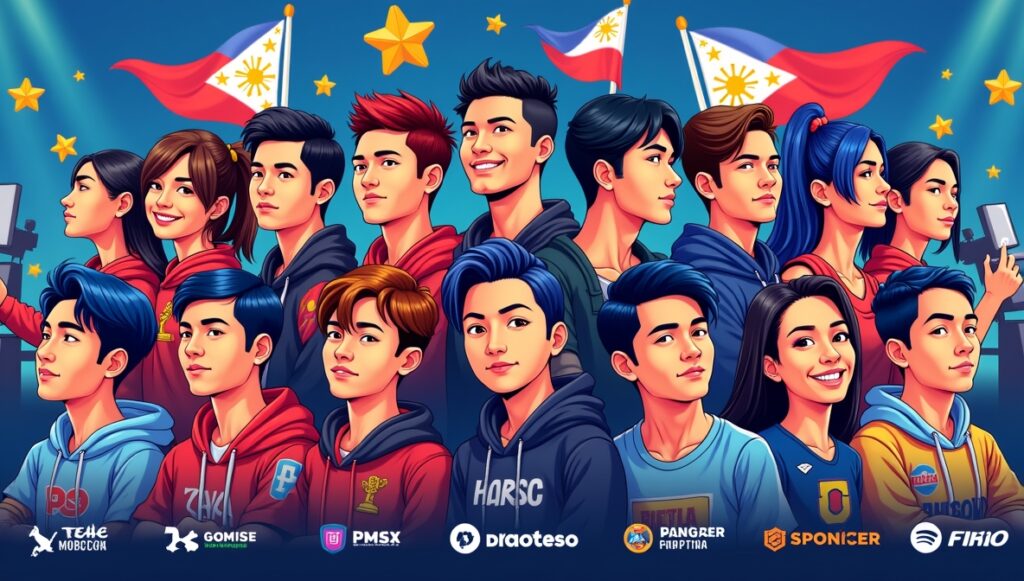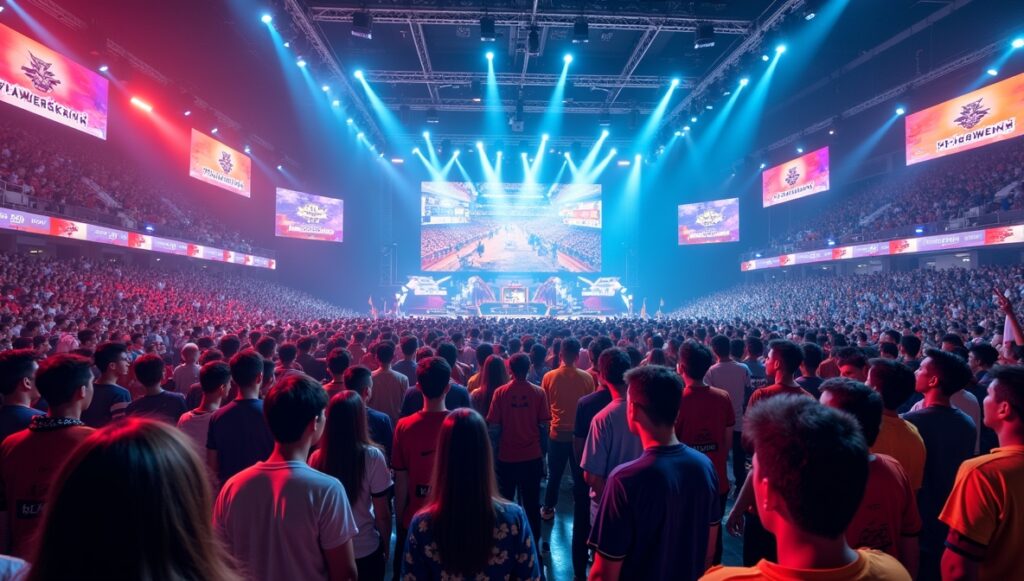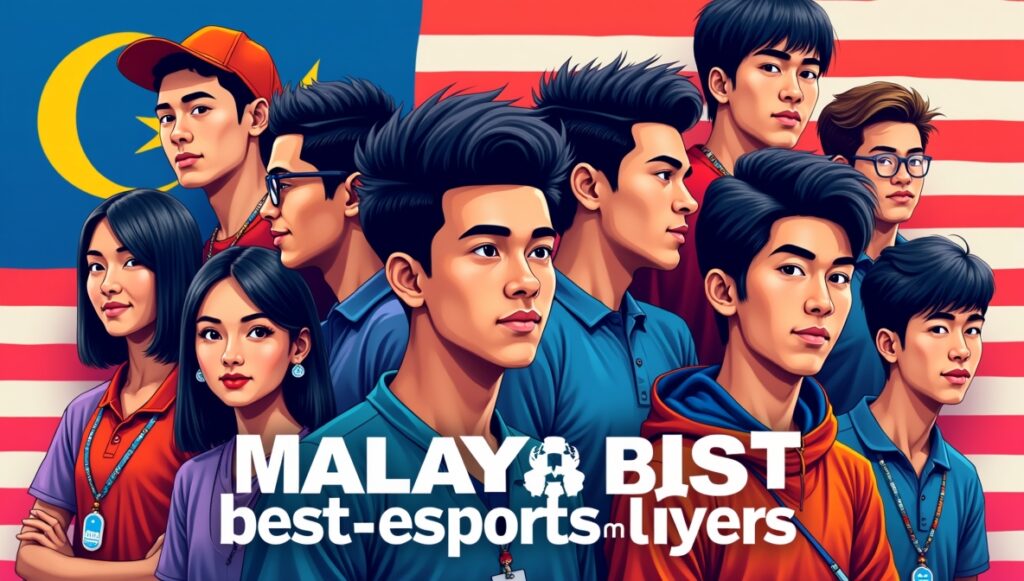Explore the rise of UK esports—from Discord gaming and military squads to pro teams and the new British Esports Arena opening in Sunderland in 2026.
From cozy Discord chats filled with British banter to multimillion-pound arenas under construction, the UK’s esports scene is undergoing a dramatic evolution. In 2025, the country isn’t just playing catch-up—it’s crafting its own identity in the global gaming arena, blending grassroots passion with high-tech ambition.
It all starts with the community. British gamers are building buzzing Discord hubs where strangers become teammates and inside jokes span across counties. It’s not uncommon to hear a Scottish accent call out plays in Rocket League, or a Welsh friend crack wise during a late-night Call of Duty grind. Discord isn’t just software—it’s the UK’s digital high street for gamers.
Zoom out, and you’ll see elite UK esports teams rising through international ranks, claiming trophies and rewriting expectations. Whether it’s Fnatic in VALORANT or Excel in the LEC, British squads are making their mark.
And it doesn’t stop there—the Royal Navy is literally sailing into the future with its own esports suite aboard HMS Prince of Wales. Meanwhile, a cutting-edge British Esports Arena is set to open in Sunderland in 2026, promising to become the country’s official home of competitive gaming.
This hub article ties all these stories together—from military innovation to grassroots community growth, legacy teams to bold new arenas. Whether you’re a casual gamer, aspiring pro, or esports industry watcher, this guide shows how the UK is redefining its role in global esports—and why the world is watching.
UK Discord Gaming: The Heartbeat of British Gamers

1Everything to know about Discord in the UK.
The UK’s gaming community has found a thriving and lively home on Discord, where players connect, compete, and share a distinctly British gaming culture. From casual conversations over a cuppa to intense esports tournaments, UK Discord servers have become the digital heartbeat of gaming across the country. Discord is much more than just a chat app—it acts as the UK’s virtual pub, high street, and stadium combined, bringing together gamers from London to Glasgow, Cardiff to Edinburgh. Whether you’re teaming up for a late-night Rocket League match or joining a voice chat pub quiz, these communities capture the essence of British camaraderie and humor.
A few years ago, options like Teamspeak or IRC dominated voice communication for gamers, but Discord arrived as a fresh, user-friendly platform that quickly gained momentum. Today, millions of British gamers and content creators rely on Discord to coordinate games, organize events, and build friendships. Its intuitive design and real-time communication capabilities make it indispensable for players and esports teams alike.
The variety of UK Discord gaming servers is vast. There are game-specific servers focusing on popular titles like FIFA, Call of Duty, and League of Legends, where players trade strategies, arrange tournaments, and swap tips. Regional servers gather gamers by geography, such as Scottish or Welsh communities, creating spaces for local banter and matchmaking. Pro team and fan servers—dedicated to organizations like Fnatic and Excel Esports—offer exclusive content, matchday discussions, and fan interaction. Tournament and event organization servers run by groups such as Epic.LAN and the UK Esports League use Discord as their command center for announcements, team communications, and live event updates.
Here’s a quick overview of common UK Discord gaming server types:
| Server Type | Focus Area | Examples | Activities |
| Game-Specific Servers | FIFA, Call of Duty, League of Legends | FUT UK Lounge, Call of Duty UK | Trading, tournaments, strategy |
| Regional & National Hubs | England, Scotland, Wales | Scottish Gamers, England Gaming | Matchmaking, local chat |
| Pro Team & Fan Servers | Fnatic, Excel Esports | Fnatic UK Fan Club, Excel Discord | Matchday hype, Q&As |
| Tournament & Event Servers | Epic.LAN, UK Esports League | Epic.LAN Discord | Event coordination, announcements |
Joining a UK Discord gaming server opens doors to more than just gameplay. New members often find access to coaching sessions, tryouts, and sponsored tournaments, along with a welcoming community where friendships blossom. Organisers use bots and roles to keep these servers running smoothly, while community events often celebrate British culture, from GMT time reminders to themed chats around national holidays.
Looking ahead, Discord’s importance in UK esports is only set to grow. Hybrid tournaments mixing online and in-person audiences already rely on Discord as a hub. Innovations like VR and AR integration and enhanced streaming tools are being explored by British teams to deepen fan engagement. Grassroots groups, university clubs, and professional organisations alike will continue to build vibrant communities through Discord, solidifying the UK’s rising global esports presence.
Whether you’re a casual gamer or an aspiring pro, stepping into the world of UK discord gaming means becoming part of a friendly, dynamic, and uniquely British gaming family. The next great esports story could begin with a simple invite to chat.
Spotlight on the Biggest UK Esports Teams
The UK esports scene has grown tremendously over the past decade, transforming from small local LAN parties into a powerhouse on the global stage. Today, British teams fill arenas, win major tournaments, and inspire a passionate fanbase that spans all corners of the country. The biggest UK esports teams have become household names, known not just for their gameplay but for their impact on esports culture, community, and industry innovation.
British esports began humbly, with early tournaments in student halls and grassroots groups focused on games like Counter-Strike and Quake. Organizations like Four Kings and Dignitas laid early foundations, but it was only with greater investment and professionalization that the scene truly exploded. Now, the UK boasts teams competing in global leagues across multiple titles, from League of Legends and VALORANT to Call of Duty and Rocket League.
What sets the biggest UK esports teams apart goes beyond wins and prize money. Their strength lies in a combination of:
- Loyal fanbases who support them season after season
- Consistent tournament results showing competitive resilience
- Innovative branding and partnerships with major sponsors and sports organizations
- Community engagement through events, social media, and youth development
- Player support systems focusing on both performance and mental health
Here’s a closer look at some of the standout British esports organizations:
- Fnatic: Founded in London in 2004, Fnatic is one of the most iconic UK teams worldwide. Their legendary League of Legends roster won the very first World Championship in 2011, and they continue to compete in CS:GO, VALORANT, and more. Fnatic’s influence has inspired an entire generation of players and fans.
- Excel Esports: Based at Twickenham Stadium, Excel Esports rose quickly to become a fixture in the League of Legends European Championship (LEC). Known for nurturing UK talent and emphasizing player wellbeing, Excel also fields competitive teams in VALORANT and FIFA.
- Team Endpoint: Established in 2016, Endpoint has made a name with strong showings in CS:GO and Rocket League, winning multiple ESL Premiership titles. Their focus on player development and strategic partnerships helps grow emerging UK talent.
- London Royal Ravens: Founded in 2019 to compete in the Call of Duty League (CDL), the Ravens became synonymous with UK Call of Duty esports. Featuring top British pros, they brought high-energy matches and passionate home crowds before relocating and rebranding in 2023.
- Guild Esports: Launched by football legend David Beckham in 2020, Guild quickly gained attention with teams in Valorant, Rocket League, and FIFA. Despite financial hurdles in 2024, their commitment to youth development and bold branding remains influential.
- Method: Originating as a World of Warcraft guild in 2005, Method expanded into multiple MMOs and RPGs, renowned for their record-breaking raid progress and strong community engagement.
Beyond competition, these teams are deeply involved in community-building efforts. Many run youth clinics, fan meetups, charity streams, and mental health initiatives. Partnerships with major brands and institutions help fund growth and amplify their impact beyond gaming.
Looking ahead, the future of UK esports is bright. There’s increased investment in academy programs, women’s teams, and new titles, while grassroots and amateur circuits receive more support. Innovative tools like Tournova’s token economy, which rewards participation and fair play, further fuel the community’s growth by promoting transparency and accessibility.
In sum, the biggest UK esports teams represent far more than just their victories. They embody the spirit of British gaming culture—passionate, resilient, and always pushing forward. Their legacy continues to inspire fans and players alike, proving that the UK is a formidable force in the global esports arena. Whether you’re a fan or an aspiring pro, these teams offer something to rally behind and a future to look forward to.
The Royal Navy Goes Competitive: Esports on HMS Prince of Wales

2Royal Navy Sets Sail with Esports
Read more → Royal Navy Sets Sail with Esports: HMS Prince of Wales Launches High-End Gaming Suite
In a groundbreaking fusion of military innovation and modern gaming culture, the Royal Navy has launched a cutting-edge esports suite aboard its flagship aircraft carrier, HMS Prince of Wales. This state-of-the-art gaming facility represents a strategic partnership between the Royal Navy, British Esports Federation, and leading technology brands Dell, Intel, and Alienware. It’s more than just a leisure space—it’s a dynamic hub aimed at enhancing crew morale, fostering essential skills, and promoting teamwork during the vessel’s global deployments.
The esports suite is equipped with 12 Alienware Aurora R15 desktops, each powered by the latest NVIDIA GeForce RTX 4080 graphics cards and Intel Core i7 processors. This setup delivers a premium gaming experience comparable to top-tier competitive esports environments, allowing the ship’s crew to engage in tournaments, friendly matches, and organized leagues. With gaming increasingly recognized for its value beyond entertainment, this facility supports the development of leadership, strategic thinking, and communication—skills vital both on the battlefield and in virtual competition.
LET(CIS) Spec Victoria Marley, a member of the HMS Prince of Wales Esports Committee, spoke about the suite’s positive impact: “Having an esports suite available to the ship’s company on Prince of Wales is a massive win for morale. Those who use it can enjoy their hobbies or discover a new one, while at the same time engaging with others outside their usual departmental circles.” This highlights how gaming helps break down silos and strengthen bonds among crew members who spend long periods away from home.
British Esports President Chester King emphasized the broader significance of this initiative: “Gaming is becoming increasingly important to the military, as it helps personnel unwind, maintain mental health, and strengthen bonds.” The partnership with the Ministry of Defence reflects a growing recognition of esports as a legitimate military sport, officially acknowledged in 2023. This move aligns with wider government strategies to integrate gaming into educational and professional spheres, including the recent creation of a “Head of Video Games and Esports” position to steer national policy.
Currently deployed as part of the UK Carrier Strike Group’s eight-month Indo-Pacific mission, the esports suite complements other onboard welfare amenities like gyms and boxing rings, underscoring the Navy’s commitment to holistic crew wellbeing. It serves as a forward-thinking model that other branches of the armed forces could soon adopt, merging entertainment with training and mental health support.
This initiative marks a significant milestone not only for military esports but also for the UK’s growing position in the global esports ecosystem. It showcases how esports can cross boundaries—from living rooms and stadiums to the decks of a state-of-the-art aircraft carrier—uniting communities and empowering individuals in new and innovative ways.
For anyone interested in how gaming is reshaping traditional sectors and fostering unexpected partnerships, this collaboration aboard HMS Prince of Wales offers an inspiring case study. It represents the future of esports as a tool for connection, education, and resilience—not just for civilians but for those serving on the front lines.
British Esports Arena Set to Launch in Sunderland by 2026
Read more → British Esports Arena Set to Open in 2026: A New Era for UK Competitive Gaming
The crown jewel of UK esports infrastructure is on the horizon: a 15,000-square-foot esports arena in Sunderland, opening in Q1 2026. Spearheaded by British Esports—the country’s national governing body for competitive gaming—the facility is being heralded as the UK’s answer to football’s St George’s Park.
This arena will feature a 200-seat theatre for live tournaments, world-class content creation studios, high-performance training spaces, and educational resources for up-and-coming players. Located next to the National Esports Performance Campus, the venue will support both grassroots growth and elite competitive training.
“This is a national home with world-class performance spaces,” said Andy Payne OBE, Chair of British Esports. “It will help train the next generation of esports talent and help grow the region to be a key leader in esports in the UK.”
The Sunderland arena will also be the first purpose-built esports facility of its kind in Europe, positioning the UK to rival esports powerhouses in Asia and North America. Construction begins in September 2025, and when the doors open, it’ll serve as a central hub for creators, players, teams, and fans.
UK Esports Tournaments: Top Events, Leagues & How to Compete
The UK’s esports scene has grown from humble beginnings—late-night LAN parties and casual meetups—into a vibrant, competitive landscape full of high-energy tournaments and leagues that attract players from all over the country. Whether you’re a newcomer or a seasoned gamer, the UK esports community offers countless opportunities to compete, watch, and connect. From massive festivals at iconic venues to grassroots university battles, the scene is alive with passion and ambition. This guide breaks down the essential UK esports tournaments you should know about, how they work, and how you can get involved.
At their core, UK esports tournaments provide structured competition across popular titles like FIFA, League of Legends, CS2, Valorant, and more. These events bring together local and national players, foster community growth, and often serve as stepping stones toward pro careers.
Here’s a quick overview of some of the top tournaments and leagues that shape the UK competitive gaming calendar:
| Tournament / League | Location(s) | Focus Games | Highlights |
| Insomnia Gaming Festival | NEC Birmingham | Rocket League, Retro Games, Cosplay | Large multi-day festival & tournament |
| ESL Premiership | Online & Various | CS:GO, Rainbow Six Siege | Broadcast-quality pro-level matches |
| Belong Arena Clash | Various Cities (London, Manchester, etc.) | Valorant, Overwatch | Local city team battles & rivalries |
| Gfinity Elite Series (Historic) | Various | FIFA, Street Fighter V | Legendary matches, launched UK talent |
| NUEL & NSE University Leagues | Universities UK-wide | League of Legends, FIFA, Valorant | Campus competitions & scholarships |
Each event provides a unique experience. Online tournaments allow easy access for anyone with a stable internet connection, ideal for players who prefer competing from home or remote locations. Meanwhile, in-person events deliver the electric atmosphere of live audiences, stage production, and community meetups—elements that create unforgettable memories and deeper social connections.
Getting involved is straightforward. Registration is usually open to solo players or teams via tournament websites, Discord servers, or university esports clubs. Many tournaments feature open qualifiers or beginner brackets, welcoming all skill levels and helping newcomers gain confidence and experience. University leagues especially offer a great platform for students to hone their skills, build networks, and even win scholarships or sponsorships.
Prizes at UK esports tournaments have grown impressively. Beyond cash rewards, winners often receive gaming gear, exclusive merchandise, media exposure, and opportunities that can launch professional esports careers. Even participants outside of the finals may earn in-game rewards, rankings boosts, and community recognition.
Some homegrown UK esports stars have risen through these ranks:
- Tekkz — Starting in UK FIFA LAN events, now a global leader in competitive FIFA.
- Team Endpoint — Renowned UK CS:GO team with multiple ESL Premiership titles.
- University of Warwick Esports — Known for award-winning teams and player development.
The thriving tournament ecosystem reflects the UK’s broader esports growth, driven by passionate players, innovative organizers, and supportive communities.
Whether you’re looking to test your skills, cheer on your favorite teams, or simply experience the excitement firsthand, UK esports tournaments offer something for everyone. The scene is inclusive and expanding, inviting players from all backgrounds to join in and shape the future of competitive gaming.
For detailed schedules, sign-up info, and the latest updates on the competitive circuit, explore our comprehensive UK esports tournaments guide. The stage is set, the community is waiting, and your next big gaming moment could be just a registration away.
Why the UK Is Poised to Be a Global Esports Leader
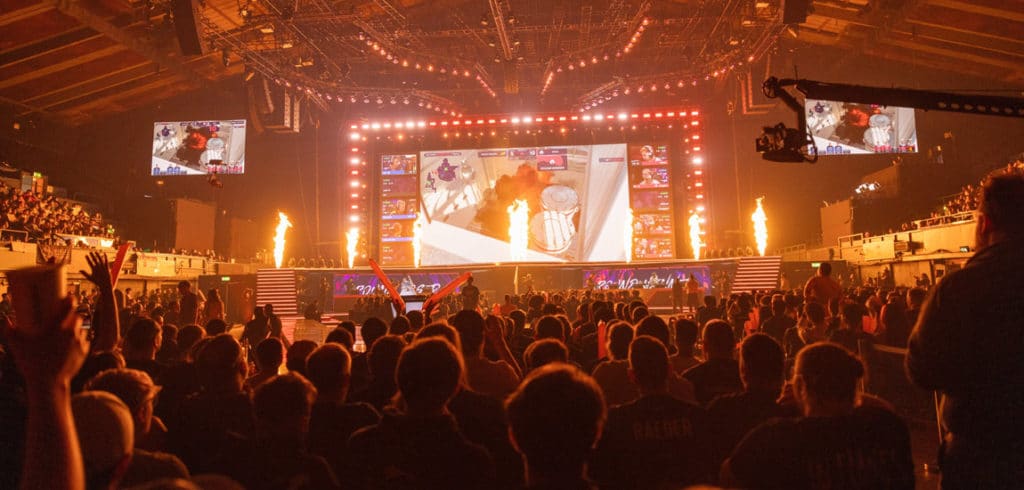
3British Esports Arena Set to Open in 2026
The United Kingdom is rapidly emerging as a formidable force on the global esports stage. Several key factors are driving this impressive ascent, positioning the UK not just as a participant but as a future leader in competitive gaming. From a mobile-first gaming culture to robust institutional support, international victories, and innovative approaches to mental health and strategy, the UK’s esports ecosystem is growing in depth and influence. Let’s explore these drivers in detail.
A Mobile-First Gaming Population
One of the UK’s major esports advantages lies in its thriving mobile gaming community. Much like other regions such as India and the MENA area, the UK enjoys widespread smartphone ownership and affordable internet connectivity, making mobile gaming accessible to a broad demographic. This accessibility has helped transition casual gamers into competitive esports players in titles like PUBG Mobile, Call of Duty Mobile, Clash Royale, and others.
Mobile esports has transformed the landscape by breaking down barriers—players no longer need expensive PCs or consoles to compete at high levels. This has broadened the pool of potential talent and energized the grassroots scene. UK gamers are increasingly embracing mobile platforms for both casual play and competitive events, with many tournaments now including mobile-specific divisions. The rise of mobile gaming tournaments and leagues within the UK is helping cultivate future stars who could compete on international stages, increasing the country’s global footprint.
Institutional & Educational Support
Another pillar of the UK’s esports rise is strong backing from educational institutions and formal organizations. Universities like Staffordshire, Suffolk, and others have pioneered dedicated esports degree programs, blending game development, management, and competitive training. This academic support is vital for creating a steady talent pipeline that feeds professional teams and industry roles.
Beyond higher education, many colleges and secondary schools are investing in on-campus esports arenas and programs, fostering competitive gaming culture from a young age. These facilities offer students hands-on experience with the latest gaming technology and provide spaces for teamwork, leadership, and competition.
At the organizational level, British Esports— the national governing body for esports in the UK — has been instrumental in expanding competitive opportunities. Through scholastic leagues, youth outreach programs, and national tournaments, they help unify the community and offer clear pathways from amateur to pro levels. Their efforts not only build skills but also promote healthy competition, diversity, and inclusion in the UK’s esports ecosystem.
International Recognition & Victories
The UK’s burgeoning reputation as an esports powerhouse is cemented by its players’ and teams’ growing success on the international stage. High-profile victories like William “Mezii” Merriman’s historic win at the BLAST.tv Austin Major in Counter-Strike: Global Offensive marked a turning point, signaling that British players can compete and triumph against the world’s best.
These achievements inspire upcoming talent and attract greater investment into UK esports organizations. British teams are increasingly visible in global tournaments across popular titles such as League of Legends, Valorant, FIFA, and Rocket League. The consistent performance of UK players helps the country gain respect and recognition, encouraging sponsors and media outlets to further support the scene.
As international victories become more frequent, the UK’s esports ecosystem strengthens, offering more lucrative career opportunities and motivating grassroots players to pursue competitive gaming seriously.
Mental Health and Strategy Integration
Esports in the UK is not only about fast reflexes and high scores—it’s also making waves in mental health and strategic skill development. Innovative initiatives are integrating esports into military and educational contexts, highlighting how competitive gaming can foster teamwork, leadership, focus, and overall wellness.
A prime example is the Royal Navy’s launch of a high-end esports suite aboard HMS Prince of Wales. This cutting-edge facility, equipped with top-tier gaming rigs, serves dual purposes: boosting crew morale during long deployments and enhancing essential soft skills like communication, strategic thinking, and collaboration. It also provides a platform to support mental health, offering sailors a positive outlet to relax, bond, and develop resilience.
Educational institutions have similarly embraced esports as a tool for building discipline, strategic planning, and social skills among students. This holistic approach reinforces the idea that esports can nurture both competitive spirit and personal growth, making it a valuable asset beyond entertainment.
The UK Gaming and Esports Ecosystem: What’s Next?
By 2026, the UK will boast:
- A national esports arena dedicated to professional-level performance and content creation
- Military recognition of esports as a legitimate sport and morale booster
- Thriving Discord communities acting as the grassroots lifeline of UK gaming
- Legacy esports teams with strong global reputations
- Education-driven esports pipelines producing the next generation of players and creators
With growing governmental support—including the creation of a “Head of Video Games and Esports” position—the UK is no longer just watching the esports race. It’s leading the charge.
Explore More:
- UK Discord Gaming: Join the British Gaming Hub
- Spotlight on the Biggest UK Esports Teams: Champions, Histories, and Their Legacy
- Royal Navy Sets Sail with Esports: HMS Prince of Wales Launches High-End Gaming Suite
- British Esports Arena Set to Open in 2026: A New Era for UK Competitive Gaming
- UK Esports Tournaments: Top Events, Leagues & How to Compete
Final Thoughts
From Discord servers to national arenas, the UK’s commitment to esports is serious, strategic, and inclusive. As the lines between entertainment, education, and competition blur, Britain is placing itself firmly on the map as a future global leader in the world of competitive gaming.
So whether you’re tuning into a VALORANT final, grinding through Apex Legends with mates, or dreaming of going pro from your bedroom in Brighton—know that you’re part of a movement that’s just getting started.
FAQs
How is the UK government supporting the growth of the esports industry beyond infrastructure projects?
The UK government has taken multiple steps to nurture the esports ecosystem, including funding initiatives for tech startups, offering grants to educational programs, and launching strategies to integrate gaming into the digital creative economy. This includes supporting research on gaming’s positive impact on mental health and skills development, encouraging public-private partnerships, and facilitating international esports events to boost tourism and local economies.
What opportunities exist for aspiring esports professionals in the UK outside of playing competitively?
The UK esports scene offers a wide range of career paths beyond pro gaming. These include roles in event management, shoutcasting (commentary), content creation, game development, coaching, team management, marketing, and esports journalism. Many universities now offer specialized degrees or certifications in esports management and production, providing structured pathways into the industry.
Are there any UK-specific esports titles or events that highlight British culture or gaming preferences?
While major global esports titles dominate the competitive scene, the UK also hosts unique local tournaments that showcase British gaming culture, such as regional LAN events featuring popular UK-favored games and themed competitions celebrating British history or pop culture. Additionally, some indie developers from the UK are creating esports-ready games with a distinct British flavor, fostering a homegrown competitive gaming identity.
